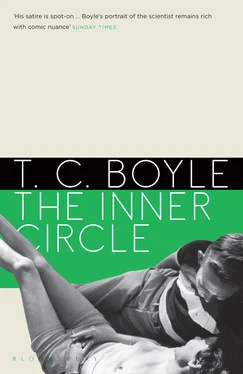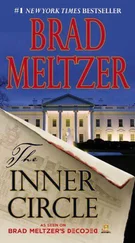“I’ve told you a thousand times,” I said, slipping into my jacket now, “it’s science, research, just like anything else. Like Lister discovering antiseptic or what’s his name with the mold on the bread. Why shouldn’t we know as much as we possibly can about everything the human animal does?” I was at the door now, on my way out, but I paused to give him his chance to reply.
“The human animal? You sound just like him, John, you realize that? That’s what he says. But what about human beings, made in the image of God? What about us? What about the soul?”
I was irritated suddenly. “There is no God. And no soul either. You know what’s wrong with you?”
He never moved from the bed, never even lifted his head. “No, but I guess you’re going to tell me.”
“You just have a narrow mind, that’s all,” I informed him, and I let the door punctuate the truth of it on my way out.
Mrs. Lorber nodded to me from her post in the rocking chair and I gave her a strained smile in return, and then I was out in the street, the pussy willows at the corner in bloom, the tight pale buds firing on the trees, a warm breeze coming up out of the south freighted with the promise of the season to come. My eyes followed a trim dark girl as I crossed Atwater in front of the campus, her legs bare and thrilling as she receded down the avenue of trees, and I thought of Iris. I hadn’t seen her in over a month, since I’d stood her up, that is, and I felt bad about it — and, of course, the longer I put off facing her the worse it was.
A car rolled slowly up the street, so slowly I thought the driver meant to pull up to the curb and park. He was an old man, his face drawn and anxious, and he gripped the wheel as if he were afraid someone was about to snatch it away from him. I watched him a moment, long enough to see a pair of bicyclists overtake him, and he never looked right or left or gave any sign he noticed them or anything else, and I found myself daydreaming about getting a car of my own someday and just taking off up over the hills and out of town until the road spooled out beneath me and I could be anywhere. Students drifted by in both directions. A pair of boxer dogs sat on their haunches and regarded me steadily from behind a picket fence.
As I turned onto First, I encountered a couple just ahead of me, the girl leaning into the man till they were a single entity, strolling along on four synchronized limbs, and I crossed to the far side of the street to avoid having to overtake them; seeing them there, seeing the way they made each other complete, made me think of Iris again. What I’d done was inexcusable, and I told myself I was going to call her the very next day — just steel myself and do it — and if she told me to get lost, drop dead, dry up and blow away, well, at least the situation would be resolved. And there was no denying I deserved it.
So I walked. And if I noticed the various operations of nature in its season of renewal — if I smelled the scent of the forsythias or watched the birds ascend to the trees with bits of straw or twig clamped transversely in their beaks — I don’t know if I really remarked them, at least not consciously. It was spring, that was all, and I was on First Street, going to the Kinseys’. For dinner.
Prok himself met me at the door. He was dressed in his gardening shorts and nothing else, his legs lean and muscled, his bare toes gripping the long polished boards of the sweet-gum floor. His hair, as always, looked as if it had been freshly barbered. “Ah, Milk,” he said, ushering me in, “I’ve just been spreading a little humus on the irises — and the lilies too. Couldn’t resist it, the weather’s so agreeable.”
He put on a short-sleeved shirt for dinner, but no shoes and no socks. Mac too was dressed more informally than she’d been on any of the previous occasions I’d come to dinner, in her own pair of shorts and a pale blue cotton blouse that showed off her throat and the delicate line of her clavicle. She seemed to have cut her hair as well, and it was as short now — nearly, that is — as a man’s. I felt a bit foolish in my coat and tie, but both Prok and Mac reassured me: they were just rushing the season a bit, that was all.
After dinner the children dispersed, and Prok, Mac and I sat in the front room awhile, chatting. Prok was at his rug, Mac at her knitting. Prok had been talking excitedly about the premature return of some sort of bird — I forget which — and how it portended an early summer, when he broke off abruptly and turned to me. “Milk,” he said, “John. Have you thought about what I said this afternoon?”
Mac’s needles flashed. She was studying me out of her soft brown eyes, a maternal smile fixed at the corners of her lips.
I told him — told them —that I had. “It would be, well,” I said, “an honor. And I want to say how much, that is — that you can be so generous to a young man, a student, who, uh—”
“Good,” Prok said, in his honeyed tones, “very good. We’ll see about increasing your hours, then, and as soon as the semester is out, you’ll come on with me full-time. Salary to continue as current. And of course we’ll be working together in the garden as well.”
The evening went on in that vein — a congratulatory vein, in a relaxed and amiable atmosphere — until Mac excused herself and Prok and I were left alone. I had no qualms about the work he was offering — it was important, exciting, noble even — and I was deeply grateful to have been offered steady employment at a time when the global situation was anything but settled, yet I did have one reservation. Or rather scruple, I suppose I should say. I didn’t feel right about what I’d done in the office behind his back. Here he was, going out of his way to make something of me, to invest in me and my future in the most concrete way, and I had let him down, cheated him, betrayed his trust in me. He was talking about the school in Indianapolis — the Porter School, it was called — describing some of the details of the more intriguing histories, especially of two of the male faculty, who were hiding their extensive H-histories from the administration and the community too, when I interrupted him.
“Professor Kinsey,” I said. “Prok. Listen, I, well, I must tell you something.”
He stopped what he was doing — his long nimble fingers arrested on the fringe of the making rug — to focus his gaze on me. “Yes,” he said. “What is it, Milk?”
There seemed to be a ringing in my ears, some sort of tocsin repeating itself there, and I must have raised my voice to be heard over it. “I have a confession to make.”
For once, Prok had nothing to say. He receded into his interview mode, all ears.
“Well, I — when you were away I broke the code. The secondary code, that is. I–I’m afraid I went through your desk.”
His first response was disbelief. “Impossible,” he said.
I held his gaze unflinchingly, the bells ringing in my ears, his eyes fading in and out of focus till they were like twin blue planets floating in the ether. “I looked up only two histories, that’s all, and I know it’s unforgivable but I just couldn’t help myself …”
One word only: “Whose?”
Something flew at the window then, beating toward the light of the lamp, a bat, I suppose, or a bird disoriented in the shadows of the fallen night. There was a dull thump of wings against the glass, and then it was gone. “Yours,” I said, the voice strangled in my throat. “And Mac’s.”
He let me dangle a moment, then said, “You broke the code?”
“Yes,” I murmured.
“I never imagined anyone could break my code, even if they did somehow get access to it. You realize I’ll now have to devise a new one?”
Читать дальше












